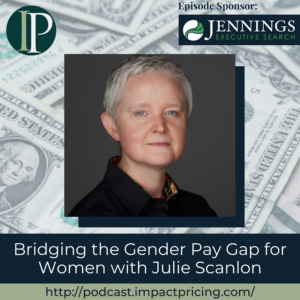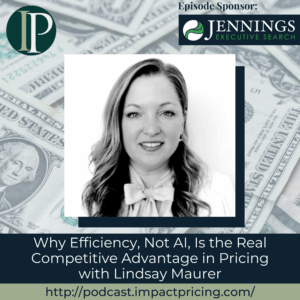Julie Scanlon is a D&I Leader 2023 (D&I Leaders: dileaders.com). She enables organizations to enhance diversity and inclusion by providing consultancy, bespoke training solutions and interventions. Supporting individuals and organizations with executive coaching, professional development and career change coaching.
In this episode, Julie highlights the challenges women face when it comes to negotiating higher pay, placing them at a disadvantage compared to men. UK studies reveal the significant disparity in earnings between genders. Julie’s primary focus is on addressing cultural and structural inequalities, and she offers insights on empowering women to strive for equal treatment.
Podcast: Play in new window | Download
Why you have to check out today’s podcast:
- Understanding the gender pay gap that exists between men and women and the necessary approach to bring about change
- Learn techniques to effectively mentor women entrepreneurs and businesses led by women, while avoiding gender bias
- Find ways to promote the recognition of women’s worth and empower them to confidently price their value
“Take the risk and ask for it.”
– Julie Scanlon
Topics Covered:
01:44 – What makes her drawn to the topic about women and men entrepreneurs and their attitudes towards pricing
02:50 – Julie’s thoughts on Mark’s statement that women are less confident than men about their pricing and business
05:48 – What could be the reason for gender pay gap in women if it is not about one’s confidence in question here
09:40 – Her thoughts on Mark’s comment that the problem is with women not asking for pay in reference to a situation raised by Julie
11:14 – A case of ‘who knows and who asks’
12:50 – Understanding why there’s a bit of a problem for women getting a no for an answer
14:39 – The best approach to coaching women entrepreneurs and those women running companies
17:07 – Julie’s suggested strategies for coaching women and the necessary shift in approach
20:39 – Julie’s reply to Mark’s question if there is the same study made in the US about the gender pay difference
21:58 – Her reaction to Mark’s desire to help women get that 43% raise in pay
23:02 – Julie’s best pricing advice
Key Takeaways:
“It is not that we’re not asking in the same way that men are, but it might also be that there’s different kinds of biases that are going on in the world that mean sometimes we don’t get what we ask for.” – Julie Scanlon
“It is actually being aware, raising awareness of the potential gender differentials. You are saying here as a kind of person sitting in front of me that you like to treat people equitably. The thing is, the world doesn’t do that. So recognizing the world doesn’t do that and thinking, okay, what can I do to mitigate against some of that unequal treatment by the world? So that might then help you adapt the way that you coach the individual that’s in front of you.” – Julie Scanlon
“The ‘being coachable’ question is absolutely vital regardless of gender. Absolutely, you need to be ready for it and you need to be open to it and not defensive.” – Julie Scanlon
People /Resources Mentioned:
- Sky News: https://news.sky.com
- IPSE: https://www.ipse.co.uk
Connect with Julie Scanlon:
Connect with Mark Stiving:
- LinkedIn: https://www.linkedin.com/in/stiving/
- Email: [email protected]
Full Interview Transcript
(Note: This transcript was created with an AI transcription service. Please forgive any transcription or grammatical errors. We probably sounded better in real life.)
Julie Scanlon
Take the risk and ask for it.
[Intro]
Mark Stiving
Today’s podcast is sponsored by Jennings Executive Search. I had a great conversation with John Jennings about the skills needed in different pricing roles. He and I think a lot alike. If you’re looking for a new pricing role, or if you’re trying to hire just the right pricing person, I strongly suggest you reach out to Jennings Executive Search. They specialize in placing pricing people. Say that three times fast.
Mark Stiving
Welcome to Impact Pricing, the podcast where we discuss pricing, value, and the gendered relationship between them. I’m Mark Stiving, and our guest today is Dr. Julie Scanlon. And here are three things you want to know about Julie before we start. She has been running Julie Scanlon Consultancy, which focuses on diversity and inclusion since 2017. She is an executive coach from Newcastle Business School, and Carrie Grant bought her family farm in Ireland. Welcome, Julie.
Julie Scanlon
Thank you, Mark. Great to be here with you.
Mark Stiving
It’s going to be fun. I hope it’s going to be very informative for me. I got to tell you that. To our listeners, Julie volunteered to talk with me when I was really short on recording podcasts. Now I have a whole bunch backed up. So, you’re probably going to hear this two months after we’ve recorded it, but specifically, she wants to talk about women and men entrepreneurs and their attitudes towards pricing. Julie, what got you interested in this topic?
Julie Scanlon
Thank you, Mark. I have a long standing interest in sex and gender through… Used to be an academic for many years, a previous career. I’m in my early fifties now, and I left to set up my consultancy around six, seven years ago. and gender has always been a key part of that. now that I’m in the entrepreneurship kind of space and self-employed space, I just throw my lens onto things like the gender pay gap in this space too.
Mark Stiving
So I think that’s pretty fair. Now, to be upfront in the beginning, I got to tell you that I try to treat everybody as individuals, right? It doesn’t matter who it is. So, I really don’t think about gender, although I can confess that there are probably two places in business that I stereotype genders, but I still treat people as individuals, so it doesn’t matter to me. And so let’s do the first one, which I think is the one that you care the most about, and that is, I get the feeling that women are less confident than men about their pricing, about their business.
Julie Scanlon
I’m not sure I would use that word, confidence. I think there are a whole set of parameters that we might make different decisions around pricing, especially value-based pricing. and these will be the way that we are potentially perceived in the world by clients as perhaps bringing different kinds of things to the table. I think there are ways that we imbibe and kind of interpolate different things as men and women as we are socialized in the way that we value ourselves and those kinds of things that we can bring. and just to put some data on that, as people will hear, I have an English accent. I’m based in the UK and some data that we have from the Association for Independent Professionals and the Self-employed, or IPSE for short, found a few years ago that there was a 43% differential between rates that men were charging to women.
And that is an enormous differential to me. So these would be independent professionals and self-employed people, so people in that kind of entrepreneurship space. So the data’s telling us something really big is going on. We don’t have enough exploration in terms of looking at the causes. I don’t think it’s necessarily about confidence per se. It’s about perhaps women perceived differently? Do we get what we ask for in the same way that men might do, and don’t want to overly stereotype, but there’s clearly that kind of differential there, which needs to explore what the evidence is behind that. And we don’t have that, we don’t have that evidence as yet.
Mark Stiving
Well, I don’t like that answer.
Julie Scanlon
Don’t you? Go on.
Mark Stiving
So, I think that 43% is huge. Oh my gosh!
Julie Scanlon
It’s massive.
Mark Stiving
And so what I don’t like is the answer that says we don’t think it’s lack of confidence. Well, we’re not sure. It’s a lack of confidence and we don’t know the answer. Right? Because it feels, gosh, men, okay, here we go, stereotyping. But this is the same stereotype, so it’s okay. So men sometimes are just super overconfident, right? They think they’re worth so much more than they really are. They think they deliver so much more value than they really do. but by the way, that’s not all men. Some men are under confident or undervalue themselves. Yeah. But I certainly see that way more in men than I do in women in terms of overcharging or overpricing. And, so if it’s not confidence, I can’t picture what it is, because, gosh, when I buy things, I don’t care if it’s a woman or a man, right. When I buy services, it just doesn’t matter to me. In fact, most of my team is women because I think they tend to do better work than men do, honestly.
Julie Scanlon
Nice to hear you say that.
Mark Stiving
Take a guess for me. What do you think it is if it’s not confidence?
Julie Scanlon
Yeah, I mean, I hear what you’re saying. There’s the element of confidence in there, but it’s how those parameters come about. Where men feel potentially that their services are worth more, that they are worth more in the world. And so all of this messaging that men receive, like from the media, from knowing things like the gender pay gap, from all the representations, we are getting all of those signals all of the time. So they are telling us our place in some ways. And we kind of, we take that in and we think this is my place, potentially. Like, not everyone, we’re not really don’t want to wish to stereotype, but that’s not necessarily about a woman needing to go on confidence training, for example. It’s actually about how we interpolate those messages.
A, it’s about the messages that we receive from the social world, but it’s also about how we manage and kind of interact with that messaging, if you see what I mean. So there will be an element of confidence in there, but what I don’t want to kind of listeners to come away with it, I guess, is that women have some kind of confidence deficit, because there’s also been data and research done that when women ask for this is kind of in the employed space, but once you ask for a salary rise, or if you ask for a higher start rate in terms of a role, you’re less likely to get it if you’re a woman. So it is not that we’re not asking in the same way that men are, but it might also be that, well, it is also, there’s different kinds of biases that are going on in the world that mean actually sometimes we don’t get what we ask for.
So I think it’s an interesting one. And there was, if I can touch on a very recent example in the UK we had a couple of journalists being interviewed on Sky News here, which is a kind of big kind of news channel about misogyny. and it was a live interview. And in the live interview, both of the journalists, the male journalist and the female journalist realized the female journalist was not being paid for this interview. And the male journalist was. Now what that is about, is, how come he was offered or he was, he kind of, the people behind that show know that there’s that disparity. He was offered a sum of money and the woman wasn’t offered a sum of money and this came out live. So there’s something going on that’s not about the woman’s confidence. There’s something there about unequal treatment kind of being seen as being okay in some ways. It’s perfect, it happened about a week ago here in the UK. So it’s very alive in my head in relation to the conversation.
Mark Stiving
Yeah. It’s interesting. God, I’m so reluctant to share, but now that I said those words, I have no choice. I have to share this. So I want to take that comment directly back to confidence for a second and say, I think that women accepting lower amounts causes the problem, or women accepting the interview without pay causes the problem. because she could easily say, no, I don’t do that without pay. And by the way, he might have done that. I’m quite often asked, hey, can you come speak for free? And I’ll say, no, and then they’ll find money and they’ll pay me to come speak. and so it may have been that, I have no idea what the situation is, but in my world, in my way of thinking of the world, I can’t control anybody else, right? I can’t tell you, hey, you can’t offer women this and men that. But what I can do is I can coach people to say, what’s your value? And how do you capture your own value? And that’s what I would be doing in this situation. I would be thinking about women and saying, look, don’t accept this. You’re worth way more than that.
Julie Scanlon
But if you haven’t got that coach in your ear and you feel that it’s normal, that nobody’s getting paid for this interview, you turn up and you do it. I’m not getting paid to speak with you, Mark. And I’m not asking for that. Obviously, this is a different fun scenario.
Mark Stiving
Neither am I.
Julie Scanlon
Equitable space. Wonderful. There we go. This is a different scenario than a national news channel where you’re being brought on as a pundit. and I just guess unless you have that, I’ve been on TV shows before and I’ve never asked for pay. I didn’t know that people got paid. Next time I will ask and I will set a fee, or I’ll ask what their fee is. I didn’t even know that people got paid. So some people, so there’s like, how do you even get in that space? Like, it hasn’t been about confidence. It hasn’t been about kind of, there’s something around that expectation that it’s just an unknown. I find it quite fascinating.
Mark Stiving
Okay. So I’m playing devil’s advocate for a second. Right? I love what we’re talking about. I think isn’t the 43% difference? Because I think that’s a huge, huge problem, right? I mean, it is a huge issue. But I would argue that if I were being interviewed, they wouldn’t offer me the money either unless I asked for it. So I think it’s, who knows and who asks is probably the issue because companies are cheap. They don’t want to pay any of us.
Julie Scanlon
Yeah. I think that’s right. Who knows and who asks is vital there. And that comes down to thinking back again, the entrepreneurship space and there being little transparency when we set our own prices, when we are practicing value-based pricing, there is so little transparency about what other competitors might be offering. Even our ballpark, because it’s an art, not a science, even our ballpark is all over the place, and so there’s something I wonder about transparency. If we, in particular spaces like coaching space or finance sector, et cetera, and working as independent professionals, could our professional bodies be doing a little bit more around that transparency of even what ballpark figures might look like? and I think that in the coaching world that some of that I’m seeing is starting to happen. We see a big range, but at least we still do see a range so that people can’t, well, hopefully people are not significantly undervaluing themselves.
Mark Stiving
Yeah. Let me ask a slightly different question. We all hate hearing the word no, right? We don’t want to lose deals. We don’t want to get turned down. but I have to tell you, my business attitude changed when I decided I didn’t care if someone said no to me. Yeah. Right. If I could just set a high price and someone said, no, I’m not going to pay that. It’s like, yep. Okay. Got it. Right. Yeah. Do you think there’s a gender thing there, or do you think that’s just a maturity or a self-comfort place?
Julie Scanlon
That’s a fascinating question. Thanks. I think I know that there has been some research in the academic space around women being taking a little longer to come back sometimes after that rejection, after that no. Again, not wishing to overly generalize, but there’s something about us being the stereotypes out there about us being kind of servers as women that the people are there to sort of hold everything up and hold everything in space. So getting that kind of no has been more problematic. I know in people that do academic research, for example, it will take a woman, the data tells us that the evidence of base around it, that’s telling us that it will take a woman longer if she gets her paper rejected, an academic paper rejected, it’ll take a longer to build up to sending that out again to another journal than for a male academic. That’s just something that’s come out the top of my head. so I think there is something, as you say, none of us like hearing that word ‘No.’ I’m wondering if some of the ways that we’re socialized and acculturated might make that a bit of a gender differential in terms of men might be more likely to be, oh, well, okay, onto the next one, kind of recover as it were, more quickly. That’s what that research element is sort of reminding me of what you’ve talked about there.
Mark Stiving
Okay. So, now I want you to help me out for a second. As already said, I can’t control the outside world, right? I can’t control your buyers or anybody’s buyers, but what I can do is I can coach or help individual entrepreneurs or companies that are run by women or run by men. How should I be thinking differently as I coach women run companies or women entrepreneurs?
Julie Scanlon
Mark, this is a wonderful question for me because I’ve just said a whole podcast series on coaching women.
Mark Stiving
Understand I’m not an executive coach. I teach people about pricing and value.
Julie Scanlon
Yeah. No, absolutely. I think, in that series, but, and in my answer to you, it is actually being aware, raising awareness of the potential gender differentials. You are saying here as a kind of person sitting in front of me that you like to treat people equitably. the thing is, the world doesn’t do that. So recognizing the world doesn’t do that and thinking, okay, what can I do to mitigate against some of that unequal treatment by the world? So that might then help you adapt the way that you coach the individual that’s in front of you. There was a fascinating conversation in that series of podcasts with a male coach, and he was talking about the kind of strategies he uses when he brings himself into the coaching space with a woman.
And it was around thinking about those big frameworks, thinking about the potential macro power dynamics that he’s really very conscious of when he’s in the coaching space. So I think it is being aware of those bigger pictures and how they might be impacting on the way that that person is treated in the world means that they may need to use slightly different strategies. That there may need to be some recognition that they may be facing different kinds of discrimination. And of course, this isn’t just about gender. It can be about all sorts of different characteristics for people. But it’s simply, it’s having that awareness and having that recognition, I think.
Mark Stiving
So I heard all of those words, but I can’t imagine what I would change based on what you just said. Most people who know me would say that I have no emotions and I think about things as logically as you possibly can. and so when I teach people about pricing and value, I’m usually focused on what’s the value to the customer. And so I don’t do the big emotional sale. Hey, how do we build the relationship and I think I would teach women the exact same way I would teach men, here’s the value of your product. How do we go sell that value? And so I’m happy to be coached.
Julie Scanlon
I think I mean, what my guest, Robert Laycock was saying within that piece was around the way that he brings himself into the space can be different and that could be about the way he is questioning that person, the way that he is even sitting in the space. He’s a reasonably big guy. Even that kind of, that self-awareness of what could this be like if you are in that position of supporting a person or teaching a person what does that feel like to be on that other side if you are kind of used to being told what to do in kind of disrespectful ways, if you’ve had kind of different experiences. so he talks about , it’s really quite sort of it’s very nuanced and kind of gentle ways of just adjusting the way that you might be approaching something with someone. So particularly in that kind of one-to-one scenario.
Mark Stiving
I was going to say, it would be interesting to see some of the way I coach and see if I change it for men versus women. I don’t know if I do. But I’m lucky in that everybody I coach comes to me and wants help. And so it’s easier to do that. I was doing a presentation a week ago and my co-presenter just called on someone and said, tell us about your pricing situation. And my co-presenter, she had picked a woman and so she told us about her pricing situation. I made a couple suggestions and it was almost like I offended her. Right. She was not in a mindset that said, hey, I’m ready to be coached. And it’s like, yeah, that’s why I only coach people who want to be coached.
Julie Scanlon
Yeah. The ‘being coachable’ question is absolutely vital regardless of gender. Absolutely, you need to be ready for it and you need to be open to it and not defensive. and so there’s a lovely example actually in that presentation last week because it feels like that person, something that touched that person, made them defensive. so they were not open to your advice. And to that kind of knowledge that they might actually be able to sort of adapt to. and so there’s something there about, is there anything that I mean you couldn’t foresee that on a call. You weren’t working with that person one-to-one. But is there anything then in our strategies, if we are working one-to-one that we can help, okay, how can I just shift that approach? Something didn’t land right there, so how can I shift that approach? Was that something about gender going on? Was it something about another characteristic? and just so that, we can get the best out of that person in front of us as well. Yeah.
Mark Stiving
Yeah. To be fair, I’ve had similar experiences with men too, right? . So, you have to be coachable. Yeah. In that one situation, it did feel semi gender related, but who knows, right?
Julie Scanlon
Yeah. Could be a whole multitude of factors going on in that scenario. And if there’s other people in the space as well, you are saying as part of a presentation that holds another dynamic because it’s sort of semi-public as well.
Mark Stiving
Yeah. Okay. where did you get, you probably said this in the beginning and I have a horrible memory. Where did you get the 43% difference in pay? Is there a study? Can you send that to me so I can put the link in the show notes?
Julie Scanlon
Yes, I will certainly send it to you. It is from 2019. Yeah. And it’s from a body called IPSE. So it’s data on the UK, Independent Professionals and Self-employed. I will send you a link definitely after the call.
Mark Stiving
Yeah. Do we have a similar study in the US?
Julie Scanlon
I’m not aware. Sorry. I am very much kind of working in the UK context. But, there must be some similar data, one would hope. And that I should, I’ll just put a word of caution that was kind of on day rates that people charge, which I know we are not interested in necessarily for this podcast. But there is no data around that kind of setting the value-based pricing. But I would think, how would that be? How would it be different? There must be some sort of differential there too.
Mark Stiving
Yeah, it would be interesting if we understood the reasons for the day rate. We could certainly make inferences. Does that apply to the value-based pricing or not?
Julie Scanlon
Yeah. And why that would be. Exactly, because if we’re talking about service-based, that we are talking about value-based really, yeah.
Mark Stiving
Okay. So here’s what I’m going to take from that 43% number. God, I think you’re going to hate my answer. If I could help women price better, they can get a 43% raise without working very hard at it.
Julie Scanlon
Yeah. There’s nothing wrong with that. Sign me up.
Mark Stiving
Nice. Well, I tell you what, my favorite thing in the world is having an impact on other people. And so what you’re saying is, I really need to work with women more than men because there’s more opportunity for impact there. I get the free 43% before I start working on going above that.
Julie Scanlon
It’s almost a free 43%, isn’t it? Yeah. It’s an interesting way of putting it. But yeah, it is, there’s something there that’s telling us. But I guess, yeah, you’d need to be able to isolate what’s going on with the men in order to understand that difference. And that’s where we don’t have that research.
Mark Stiving
Yeah. It would be really fascinating to know. Okay, Julie, we’re going to start wrapping this up, but I’m going to ask you the final question that I ask everybody. Yeah. Even if it doesn’t fit your world.
Julie Scanlon
Go on.
Mark Stiving
What is one piece of pricing advice you would give our listeners that you think could have a big impact on their business?
Julie Scanlon
I would say take the risk. Take the risk and ask for it. I need to take my own advice there.
Mark Stiving
Well, take the risk. Well, so are we back to that? I don’t want to hear no.
Julie Scanlon
Maybe we are underneath that and not being scared of getting the no. Yeah. I guess that’s under that piece of advice, isn’t it? Not being scared of getting the no.
Mark Stiving
So someone I listened to quite regularly just wrote a new book and, God, I don’t remember the name of his book, but, one of the things he said, which was so brilliant, is failure is not the opposite of success. Failure are your stepping stones to success.
Julie Scanlon
That’s lovely.
Mark Stiving
Yeah. That’s lovely. And so how many times do we have to hear no so that we can get to yes and no is just a stepping stone.
Julie Scanlon
Yeah.
Mark Stiving
Julie, thank you so much for your time today. If anybody wants to contact you, how can they do that?
Julie Scanlon
Thank you, Mark. The easiest way is probably through LinkedIn where they’ll find me as Dr. Julie Scanlon.
Mark Stiving
Excellent. And to our listeners, thank you so much for your time. If you enjoyed this, would you please leave us a rating and a review? And finally, if you have any questions or comments about the podcast or pricing in general, feel free to email me, [email protected]. Now, go make an impact!
Mark Stiving
Thanks again to Jennings Executive Search for sponsoring our podcast. If you’re looking to hire someone in pricing, I suggest you contact someone who knows pricing people contact Jennings Executive Search.

















